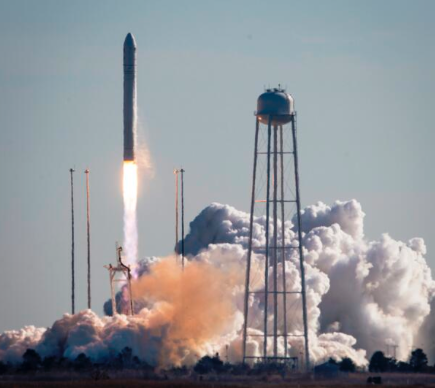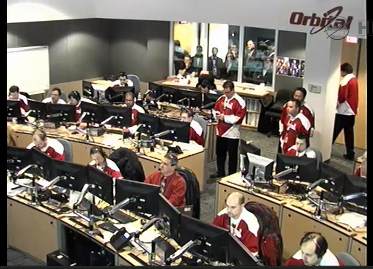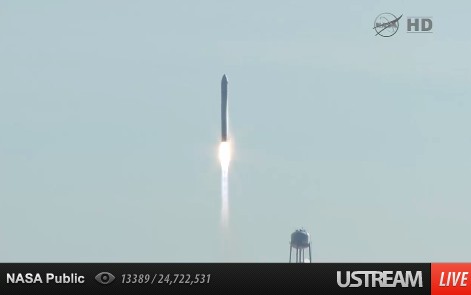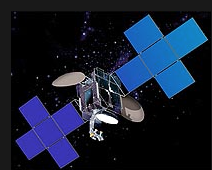
[SatNews] Further emphasizing this is a group effort... team shirts of red and white were proudly worn in mission control center as the launch took off without so much as a hiccup...
Orbital Sciences Corp. launched its Cygnus cargo spacecraft aboard its Antares rocket at 1:07 p.m. EST Thursday from Launch Pad 0A at NASA’s Wallops Flight Facility in Virginia.
Cygnus is now traveling 17,500 mph in Earth's orbit to rendezvous with the International Space Station on Sunday, January 12, for the Orbital-1 cargo resupply mission. The post-launch press conference will be at 2:30 p.m. EST on NASA TV; NASA will take questions from Twitter and Google+ using the hashtag #askNASA.
The solar array panels have successfully deployed and second stage separation went smoothly.
There was a bit of concern regarding the radiation in the upper atmosphere due to a solar flare but yesterday, Wednesday, the go was given for today's launch.

Go Team Orbital (in red and white shirts).
Upon a deeper examination of the current space weather environment, Orbital’s engineering team, in consultation with NASA, has determined that the risk to launch success is within acceptable limits established at the outset of the Antares program.
For the first CRS mission, the Cygnus spacecraft is carrying 2,780 pounds (1,260 kilograms) of supplies to the Space Station, including science experiments to expand the research capability of the Expedition 38 crew members aboard the orbiting laboratory, along with crew provisions, spare parts and experiment hardware. Also aboard the flight are 23 student experiments that will involve more than 8,600 elementary, junior high and high school students from the United States and Canada. These experiments address life sciences topics ranging from vaccine effectiveness and amoeba reproduction to calcium loss in bones and liquid behavior in space. This mission, together with future Cygnus flights, will ensure a robust national capability to deliver critical research equipment and samples to orbit, significantly increasing NASA's ability to conduct new scientific investigations in the only laboratory in microgravity.
Statement From Orbital
Company Completes Third Successful Antares Launch
in the Past Nine Months
Orbital Sciences Corporation (NYSE: ORB), one of the world’s leading space technology companies, today announced it successfully launched its Antares™ medium-class rocket carrying the first of eight Cygnus™ cargo logistics spacecraft missions to the International Space Station (ISS) as part of its $1.9 billion Commercial Resupply Services (CRS) contract with NASA. The launch of Orbital’s Antares rocket and Cygnus cargo logistics spacecraft will culminate in rendezvous and berthing with the ISS on Sunday, January 12 at approximately 6:00 a.m. (EST). Cygnus will deliver approximately 2,780 lbs. (1,260 kg.) of cargo to the Expedition 38 astronauts and remain attached to the station until February 18 before departing with approximately 2,800 lbs. (1,300 kg.) of disposable cargo for a safe, destructive reentry over the Pacific Ocean.

Lift-off of Orbital’s Antares rocket occurred today at 1:07 p.m. (EST) from NASA’s Wallops Flight Facility in eastern Virginia. Following a 10-minute ascent, the Cygnus spacecraft was successfully deployed by the Antares upper stage and placed into its intended orbit of about 135 x 175 miles (220 X 280 km) above the Earth, inclined at 51.6 degrees to the equator. Approximately 25 minutes later, Orbital’s engineering team confirmed that reliable communications had been established and that the solar arrays were fully deployed, providing the necessary electrical power to command the spacecraft.
“It was another excellent launch of Antares, and so far, our first CRS mission is off to a great start with Cygnus operating exactly as anticipated at this early stage of the mission,” said Mr. David W. Thompson, Orbital’s President and Chief Executive Officer. “Our team has put in a lot of hard work to get to the point of performing regular ISS cargo delivery trips for NASA. It’s an exciting day for all of us and I’m looking forward to completing this and our future CRS missions safely and successfully for our NASA customer.”
Under a $1.9 billion CRS contract with NASA, Orbital will use Antares and Cygnus to deliver up to 44,000 pounds (20,000 kilograms) of cargo to the ISS over eight missions through late 2016. For these missions, NASA will manifest a variety of essential items based on ISS program needs, including food, clothing, crew supplies, spare parts and equipment, and scientific experiments.
Orbital privately developed the Antares launch vehicle to provide low-cost, reliable access to space for medium-class payloads. It is the largest and most complex rocket the company has ever produced. Under the Commercial Orbital Transportation Services (COTS) joint research and development initiative with NASA, Orbital also developed the Cygnus spacecraft, which is an advanced maneuvering vehicle that meets the stringent human-rated safety requirements for ISS operations. Together, these products showcase Orbital’s ability to apply rigorous engineering approaches and commercial business practices to significantly shorten development timelines and lower operational costs of sophisticated space systems as compared to traditional government-run programs.
About Antares
The Antares medium-class launch vehicle will provide a major increase in the payload launch capability that Orbital can provide to NASA, the U.S. Air Force and commercial customers. The Antares rocket will launch spacecraft weighing up to 14,000 lbs. into low-Earth orbit, as well as lighter-weight payloads into higher-energy orbits. Orbital’s newest launcher is currently on-ramped to both the NASA Launch Services-2 and the U.S. Air Force’s Orbital/Suborbital Program-3 contracts, enabling the two largest U.S. government space launch customers to order Antares for “right-size and right-price” launch services for medium-class spacecraft. For more information on Antares, visit http://www.orbital.com/SpaceLaunch/Antares/.
About Cygnus
Orbital developed the Cygnus cargo spacecraft as part of its COTS joint research and development initiative with NASA. Cygnus consists of a common Service Module (SM) and a Pressurized Cargo Module (PCM). The SM incorporates avionics, power and propulsion systems already successfully flown aboard dozens of Orbital’s LEOStar™ and GEOStar™ satellite products. The PCM, designed and built by Thales Alenia Space under a subcontract from Orbital, is based on the Multi-Purpose Logistics Module (MPLM) used with the Space Shuttle. For more information on Cygnus, visit http://www.orbital.com/NewsInfo/Publications/Cygnus_fact.pdf.
End Statement From Orbital
Statement from CASIS
The Center for the Advancement of Science in Space (CASIS) is proud to announce its first sponsored research payloads have launched to the International Space Station (ISS) on board the Orbital Sciences Corporation Cygnus cargo capsule. This launch marks a historic moment for the nonprofit responsible for promoting and managing research on board the ISS U.S. National Laboratory, as a variety of investigations under the CASIS manifest are part of Orbital’s first full resupply mission to the orbiting laboratory.
Orbital was selected by NASA to begin ISS resupply flights under the Commercial Resupply Service contract which authorizes eight missions to carry approximately 20,000 kilograms of cargo to the station over time. On its test flight in September 2013, the Cygnus capsule transported three CASIS-funded education payloads from the Student Spaceflight Experiments Program (SSEP). However, this flight signifies the first major payloads that CASIS brokered through its own outreach activities.
Research on this flight consists of a variety of payloads, including an investigation focused on antibiotic research examining physical and gene expression changes in bacteria in space with hopes of creating new and improved drug therapies on Earth. Multiple education payloads also will head to the ISS, such as Ants In Space – which will observe the colonization habits of ants in a microgravity environment and compare their patterns to those on Earth. Additionally, Procter & Gamble is teaming with Zin Technologies to investigate the absence of buoyancy-driven convection, specifically within colloids for the potential production of commercial products.
“Today’s launch is a signature moment for CASIS and our partner, Orbital Sciences Corporation. The ability to partner with researchers and send their concepts to the ISS under a CASIS manifest is now real,” said CASIS President and Executive Director, Gregory H. Johnson. “I firmly believe that today’s launch is a pivotal moment to enable science in space for life on Earth.”
In February 2014, fellow launch provider Space Exploration Technologies Corporation (SpaceX) is slated to send additional CASIS-sponsored investigations on board its Dragon capsule. To learn more about the research destined for the ISS during CASIS’ first official launch increment period, Advancing Research Knowledge 1 (ARK1), please visit.
End Statement from CASIS
Orbital privately developed the Antares launch vehicle to provide low-cost, reliable access to space for medium-class payloads. It is the largest and most complex rocket the company has ever produced. Under the Commercial Orbital Transportation Services (COTS) joint research and development initiative with NASA, Orbital also developed the Cygnus spacecraft, which is an advanced maneuvering vehicle that meets the stringent human-rated safety requirements for ISS operations. Together, these products showcase Orbital’s ability to apply rigorous engineering approaches and commercial business practices to significantly shorten development timelines and lower operational costs of sophisticated space systems as compared to traditional government-run programs.
Additionally, this delay means that Peru's Universidad Alas Peruanas (UAP) will also have to wait until Thursday for their satellite transportation into space. The satellite, which was designed by students and faculty at UAP, would have been launched on the Antares rocket today for delivery to the ISS, however NASA decided to postpone the launch after determining that the high level of solar flares and radiation could damage the Antares rocket’s electrical system.
The satellite, which weighs less than a kilogram, is cube-shaped and programmed to collect data about the climate in outer space. After being launched by the Antares rocket, the satellite will make its way to the International Space Station (ISS). From the ISS, the satellite will be placed in orbit with the help of a robotic arm. While this will not be the first Peruvian satellite in outer space, it will be the first Peruvian satellite sent into space by NASA. In November, two satellites designed and constructed by students and faculty from the Pontificia Universidad Católica del Perú were launched from the Yasny cosmodrome in Russia.
Orbital develops and manufactures small- and medium-class rockets and space systems for commercial, military and civil government customers. The company’s primary products are satellites and launch vehicles, including low-Earth orbit, geosynchronous-Earth orbit and planetary spacecraft for communications, remote sensing, scientific and defense missions; human-rated space systems for Earth-orbit, lunar and other missions; ground- and air-launched rockets that deliver satellites into orbit; and missile defense systems that are used as interceptor and target vehicles. Orbital also provides satellite subsystems and space-related technical services to government agencies and laboratories. More information about Orbital can be found at.


